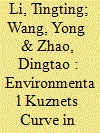| Srl | Item |
| 1 |
ID:
150888


|
|
|
|
|
| Summary/Abstract |
This paper applies a panel of 28 provinces of China from 1996 to 2012 to study the impacts of economic development, energy consumption, trade openness, and urbanization on the carbon dioxide, waste water, and waste solid emissions. By estimating a dynamic panel model with the system Generalized Method of Moments (GMM) estimator and an autoregressive distributed lag (ARDL) model with alternative panel estimators, respectively, we find that the Environmental Kuznets Curve (EKC) hypothesis is well supported for all three major pollutant emissions in China across different models and estimation methods. Our study also confirms positive effects of energy consumption on various pollutant emissions. In addition, we find some evidence that trade and urbanization may deteriorate environmental quality in the long run, albeit not in the short run. From policy perspective, our estimation results bode well for Chinese government's goal of capping greenhouse emissions by 2030 as outlined in the recent China-US climate accord, while containing energy consumption and harm effects from expanding trade and urbanization remains some environmental challenges that China faces.
|
|
|
|
|
|
|
|
|
|
|
|
|
|
|
|
| 2 |
ID:
161889


|
|
|
|
|
| Summary/Abstract |
This paper studies the growth channels of human capital using the provincial level panel data in post-reform China. Specifically, it aims at distinguishing between the “factor-accumulation channel,” whereby human capital augments production as an input factor, and the “productivity channel,” whereby human capital affects output by raising total factor productivity. Our system GMM estimation results support the hypothesis that different types of human capital affect economic growth through different channels: Basic human capital contributes to growth via the “factor-accumulation channel” and advanced human capital via the “productivity channel,” both individually and simultaneously.
|
|
|
|
|
|
|
|
|
|
|
|
|
|
|
|